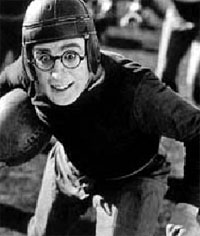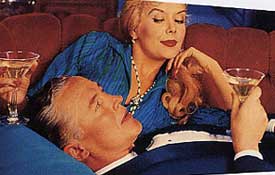Hang in there
Harold Lloyd was featured on TCM last night — I got hooked by Safety Last and stayed up late for The Freshman, and there are 2 or 3 more of his films waiting at home in the Tivo. Brilliant stuff.
Of the three "masters" of silent comedy, Lloyd had the most gumption. Keaton was always the calm center in an increasingly chaotic universe, protected by his perfect, immediate sense of logic and his innate understanding of the mechanics of things. Chaplin was a true clown and a mischievous rascal, dancing through his world, flirting and teasing and finding trouble, letting himself wobble between joy and despair.
Lloyd was all grit and determination. Unlike Keaton, he found himself mostly at odds with his surroundings — the universe was rarely cooperative, and usually quite hostile. Unlike Chaplin, he fiercely believed in himself and the people around him, giving him a naive but honest optimism and confidence that girded him against a malevolent world.
In the face of adversity, Lloyd pressed on out of sheer doggedness (Keaton was driven by necessity, or momentum; Chaplin by playfulness, desire, hunger, or spite). The harder Lloyd tried, the more the world would throw at him to trip him up — his climactic moments were not so much a test of skill as resolve. He was the kind of character you could easily transpose to the beaches of Normandy, the top of Everest, or the 2004 Red Sox.
 Consider his most celebrated sequence — the climbing of the building in Safety Last. Keaton might attempt such a stunt if a lady (or dog) were in danger; Chaplin would do it to escape a cop (or dog). Lloyd finds himself in this position for no good reason; it's just a publicity stunt, and he's "filling in" for the real climber, who is dodging an irate policeman. If Harold can just climb one story, the climber will take his place and complete the ascent... as soon as he "ditches this cop." Naturally, each time Harold reaches the comparative safety of the next ledge, the climber signals him to ascend just one more floor, promising to meet him there.
Consider his most celebrated sequence — the climbing of the building in Safety Last. Keaton might attempt such a stunt if a lady (or dog) were in danger; Chaplin would do it to escape a cop (or dog). Lloyd finds himself in this position for no good reason; it's just a publicity stunt, and he's "filling in" for the real climber, who is dodging an irate policeman. If Harold can just climb one story, the climber will take his place and complete the ascent... as soon as he "ditches this cop." Naturally, each time Harold reaches the comparative safety of the next ledge, the climber signals him to ascend just one more floor, promising to meet him there.As he climbs — slowly and clumsily, floor by floor — to progressively dizzying heights, Harold gets tangled in a net, attacked by pigeons, smacked by a board, caught up in a clock, and punched in the face. A mouse runs up his pant leg. His toes get stuck in a foothold. A helpful old lady informs him that what he's doing might be dangerous.
There's really no reason for Harold to put up with this, except that the crowd below is cheering him on, as are the well-wishers whose heads conveniently pop out of windows as he climbs. It isn't courage that drives him — he is quite terrified and fully realizes the absurdity of his situation. But Lloyd keeps going because at this point he's committed. The shame of giving up would be worse than the splat associated with a very different kind of failure. There's just no quitting in this man.
It's also worth noting that Lloyd did his own climbing in the film, even though he was missing the thumb and index finger of his right hand (and wore a prosthetic glove to hide this fact), suggesting that Harold Lloyd the man had at least as much sand as Harold Lloyd the character.
 Another telling sequence is the climactic football game in The Freshman. Lloyd desperately wants to get in the game, even though the coach considers him worthless (earlier in the film, the coach offers him a position on the team as tackling dummy, which Harold accepts with gusto, clapping his encouragement to his teammates even as they pummel him mercilessly). Harold explodes with joy when he's finally called onto to field, only to be told to give his jersey to another player whose shirt has been torn. Harold looks devastated for a heartbeat, then pulls off his jersey with sudden enthusiasm, slapping his teammate on the back and running off the field clapping for his team. Always the right thing, even when he's being humiliated.
Another telling sequence is the climactic football game in The Freshman. Lloyd desperately wants to get in the game, even though the coach considers him worthless (earlier in the film, the coach offers him a position on the team as tackling dummy, which Harold accepts with gusto, clapping his encouragement to his teammates even as they pummel him mercilessly). Harold explodes with joy when he's finally called onto to field, only to be told to give his jersey to another player whose shirt has been torn. Harold looks devastated for a heartbeat, then pulls off his jersey with sudden enthusiasm, slapping his teammate on the back and running off the field clapping for his team. Always the right thing, even when he's being humiliated.Keaton remains my favorite — he is the truly heroic one (and classically so), the selfless and serious man of action who could bend the universe to his needs. Watching him, you can see the makings of Jackie Chan, Indiana Jones, or even the acrobatic heroes of The Matrix. But I'd rather have Harold Lloyd as a friend or a neighbor.
Few people possess the kind of supernatural talent it takes to be like Keaton. Far too many people behave like Chaplin, masking their pain with playfulness. What the world really needs is more of the doggedness, optimism, and enthusiasm of Mr. Lloyd.
Worth reading: Roger Ebert's insights and reflections on Harold Lloyd in his "Great Movies" review of Safety Last. Excerpt:
I could understand why Lloyd outgrossed Chaplin and Keaton in the 1920s: Not because he was funnier or more poignant, but because he was merely mortal and their characters were from another plane of existence. Lloyd is a real man climbing a building; Keaton, as he stands just exactly where a building will not crush him, is an instrument of cosmic fate. And Chaplin is a visitor to our universe from the one that exists in his mind.





0 Comments:
Post a Comment
<< Home